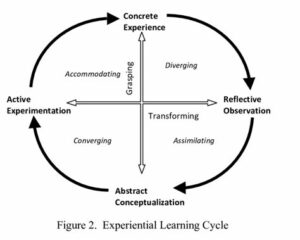Dewey, Lewin, Piaget, and Kolb emphasize learning by doing. Individuals learn best through experience, by direct encounters in the present, and by adapting to the situation as it unfolds. The coaching examines experience to reveal insights and learning.
Kolb’s inductive learning cycle has four stages: concrete experience, reflective observation, abstract conceptualization, and active experimentation. The four elements define how people learn from experience and correspond to how people process experience to generate understanding, which leads to the four basic learning styles.
Concrete experience (CE): Engage in action. Then report the action, describing it fully.
Reflective observation (RO): Reflect on the action’s effects and understand them to anticipate what would follow if you repeated it in the same circumstances. In coaching, consider feelings and explore different perspectives on the same experience.
Abstract conceptualization (AC): Understand general principles of action. In coaching, draw out prior knowledge and understanding to guide sensemaking.
Active experimentation (AE) or planning a new course of action: Test, adjust, and plan a new action. In coaching, assist learning from the experience and plan to act accordingly. Guide the learner to appreciate the whole learning cycle as a continuous learning and growth process.
To summarize: The person acts, reflects on it, forms and tests theories, and adjusts and acts in new ways, entering the next cycle.
The GROW coaching model maps onto these four learning cycle phases. For example, “Goal setting” equates to an actual or proposed concrete experience; “exploring Reality” is equivalent to reflective observation; “Options” involve abstract conceptualization; and “What will you do!” suggests active experimentation.
For effective learning and development, engage fully in each cycle. Spend enough time on each stage. Counter any inclination to favor one of the four stages. Be aware of your learning preference. After you complete a cycle, your responses will be different and better developed when you encounter the same situation.

{From: Passarelli & Kolb, 2012. The Learning Way: Learning from Experience as the Path to Lifelong Learning and Development}
Learning Styles
The four experiential learning cycle phases engage different learner abilities and individual learning orientations. Of course, people have preferences, and the learning cycle can begin at any point. But the learner should experience, fully engage in each stage, and complete the cycle to learn and develop.
In coaching, introduce a learning styles questionnaire to gauge client preferences. Discuss the strengths and weaknesses of orienting and working in one learning cycle area. Then, capitalize on existing strengths and bolster weak areas. Neglecting some styles forms a learning obstacle. The client can use the same lens to understand the strengths and weaknesses of others, family members, and colleagues.
The Learning Styles Inventory is a model of learning style preferences. People favor particular learning cycle stages, but they can develop other styles. Honey and Mumford’s Learning Styles Questionnaire (LSQ) provides a typology:
The Activist or accommodator prefers doing and experiencing (AE/CE): finding out by doing things, is a risk-taker, reacts well to circumstances, and solves problems intuitively.
The Reflector or diverger likes to observe and reflect (CE/RO): is imaginative, generates ideas, sees from different perspectives, is interested in people, and has broad cultural interests.
The Theorist or assimilator wants to understand reasons, concepts, and relationships (RO/AC): he creates theoretical models, uses inductive reasoning, and focuses on abstract concepts rather than people.
The Pragmatist or converger likes to try things out to see if they work (AC/AE): inclines to the practical application of ideas, can focus on deductive reasoning on specific problems, is unemotional, with limited but often very focused interests.
Coaching applications
Share the experiential learning cycle and styles with the client to help understand how people work through problems. Use assessments.
Help the client expand their learning toolkit and use various coping strategies when considering the next steps. Suppose the client is an accommodator, for example, inclined to engage mainly in concrete experience. In that case, they can work to become more an assimilator to understand reasons, concepts, and relationships and create theoretical models of their experience.
Encourage the client to reflect on an experience as a learning source, describing their experience and its effects: What happened? What went well? What did not go so well? What was the outcome? What do you think was going on? What else? What are you learning about yourself? About the situation? About others?
At the abstract conceptualization stage, help the client identify the process and interpret the event: What was the process, and how did it play out? What did you want the outcome to be? Was the outcome what you expected or wanted?
At the active experimentation stage, ask more speculative questions: Could you have done it differently? What might you have done? If you were to act in this way, what would be the likely outcome?